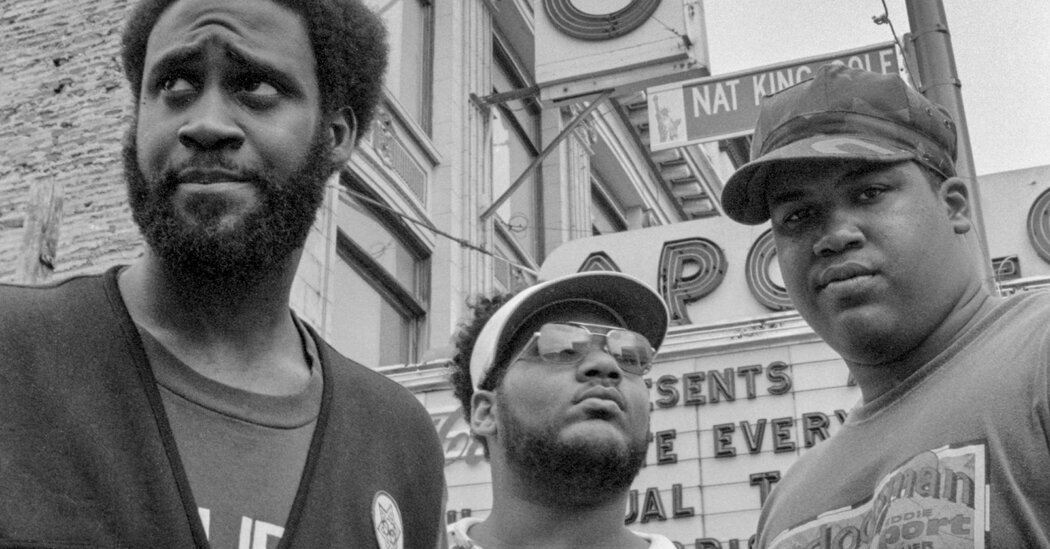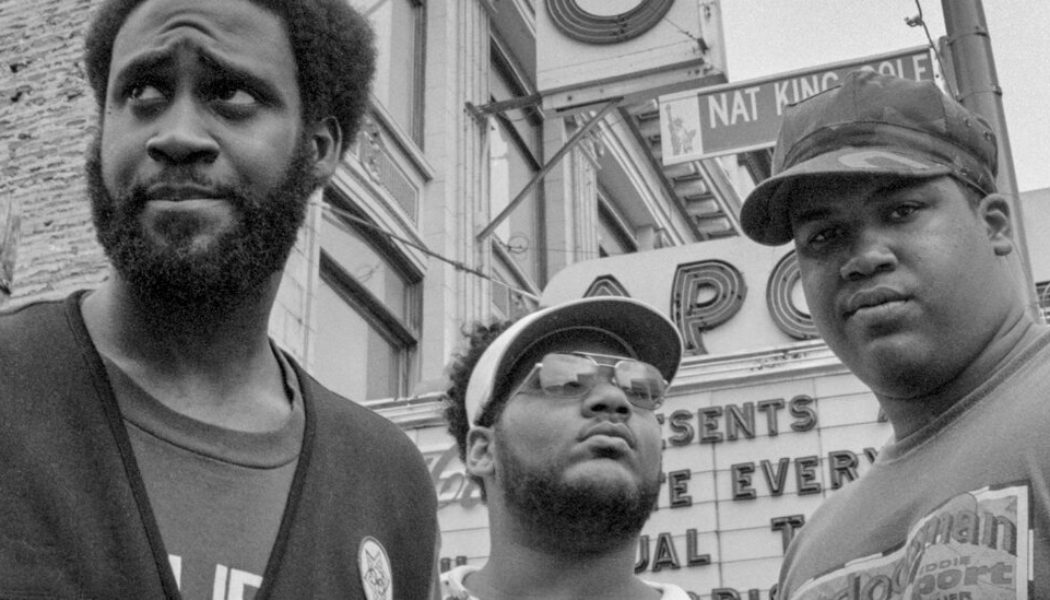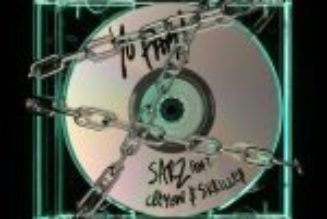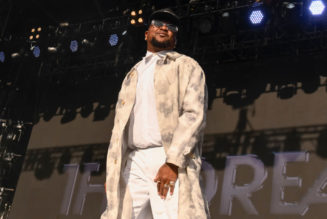
The influential rap trio’s catalog has long been absent from streaming services. Now its first six albums will be available, just weeks after the death of one of its members.
At the Grammy Awards last month, the rap trio De La Soul was booked for the show’s 50th anniversary tribute to hip-hop, alongside more than two dozen performers. The timing was perfect, coming just a few weeks ahead of the long-delayed digital release of the group’s storied catalog.
But the day before the ceremony, David Jolicoeur, who was known as Trugoy the Dove — and had long been public about having congestive heart failure — told his bandmates he was too ill to make it; Vincent Mason, a.k.a. Maseo, the group’s D.J., also had health problems. Kevin Mercer, known as Posdnuos, represented the trio alone, rapping part of “Buddy” from its classic 1989 debut, “3 Feet High and Rising.”
“It was a bittersweet performance for me,” Mercer said last week, “because I was looking so forward to having my brothers there for this amazing moment.” A week after the Grammys, Jolicoeur died at age 54.
Another painful victory for De La Soul arrives on Friday, when the group’s first six albums will finally become available on streaming services after years of struggles with record companies that have kept that music — one of hip-hop’s most cherished and influential bodies of work — largely inaccessible to longtime fans, and invisible to younger audiences. For the last year and a half, each of the members had been closely involved in the reissue project, digging through old tapes to identify samples that still needed to be cleared and making cosmetic edits when they could not.
“We fought so hard and so long for it,” Mason said. “For him not to be here, it’s awkward; it hurts.”
The two surviving members of De La Soul spoke in a joint phone interview a day after attending Jolicoeur’s cremation service. They were clearly still mourning their bandmate of more than three decades; they formed the group while teenagers at Amityville Memorial High School on Long Island. But a sense of joy — and flashes of their signature goofball humor — also shone through as they reminisced about their creative process on “3 Feet High” and successive LPs like “De La Soul Is Dead” (1991) and “Buhloone Mindstate” (1993).
Those albums broke new ground with an eclectic, freewheeling sampling style that the group developed with its producer, Prince Paul, and an unapologetically nerdy approach to rapping. “The Magic Number,” from “3 Feet High,” weaves together the sounds of “Schoolhouse Rock!,” the 1970s educational cartoon, with snippets of Johnny Cash, vintage funk and disco. Elsewhere on the album, Posdnuos and Trugoy — that’s “sound sop” and yogurt spelled backward — rapped about girls from English class and referred to themselves as Plug One and Plug Two.
“It was just a process of all our separate lives and the music within them just being dumped into sessions of fun,” Mercer said, describing their approach in the studio. They would arrive bursting with ideas, and with armfuls of records to sample, throwing everything into the mix and keeping what sounded best.
“You came with a bunch of records to see if it worked or not,” Mercer added. “And, luckily for us, they worked.”
Prince Paul, in a separate interview, recalled: “The beauty of the record was just imagination. We were thinking of things to do with music that we had never heard anybody do before.”
The group’s look, too, stood in stark contrast to the black leather and Kangol hats that became the uniform of 1980s hip-hop — they wore baggy clothes and were pictured in Day-Glo colors with peace signs and flowers.
“They looked like outcasts,” recalled Monica Lynch, who signed the group to Tommy Boy Records in 1988. “Dave had this Gumby haircut, they’re wearing weird clothes. They looked like the antithesis of what was the prevailing style aesthetic in hip-hop at that time.”
The group all but created the subgenre of alternative hip-hop. But its approach to sampling turned out to be a bit too freewheeling; not everything had been licensed properly from the owners of the original copyrights. One problem was a 12-second, slowed-down fragment from the 1960s psychedelic pop group the Turtles, who in 1991 sued De La Soul for more than $1 million.
The Turtles’ case, which was settled for an undisclosed amount, was one of the first high-profile lawsuits over sampling, and it had far-reaching implications throughout the music industry. “De La became the guinea pig for all of it,” said Michelle Bayer, a music-publishing executive who has long worked with the trio. “They became the example of, ‘don’t do what these guys did.’”
After the Tommy Boy catalog was sold to Warner Music in 2002, De La Soul’s music languished there, never officially released in digital form. In 2016, a representative of Rhino, Warner’s catalog division, told The New York Times: “We don’t believe it is possible to clear all of the samples for digital use.”
For years, De La Soul wrestled with the frustration of invisibility and lost revenue. In 2014, the group gave away downloads of its original albums without Warner’s authorization. Three years later, Tom Silverman, the founder of Tommy Boy, reacquired the label, but De La Soul feuded with him over its contract, and called for a boycott of the label. Silverman declined to comment about that conflict. In 2021, he sold Tommy Boy to the music company Reservoir Media for $100 million.
Rell Lafargue, the president of Reservoir, said his company was determined to get the De La Soul catalog online, and gave the group ownership of its master recordings. “It became clear,” he said, “that today the only way this was going to work was to have the guys do it themselves, and we would support them.”
Thus began an intensive process of digging through every snippet of tape from the band’s six Tommy Boy albums — also including “Stakes Is High” (1996), “Art Official Intelligence: Mosaic Thump” (2000) and “AOI: Bonix” (2001) — to check, and clear, every sample. More than 200 appear across the entire catalog, Reservoir said; since each piece can be represented by multiple copyright owners, the work involved hundreds of contacts.
The band hired Deborah Mannis-Gardner, the rap world’s go-to sample clearance agent, and the work took more than a year. Mannis-Gardner said that De La Soul’s ownership was important in helping her convince copyright holders “not to try to get blood from a stone” — to keep financial terms reasonable. “Everyone was just really incredible, because they want to be part of history,” she added.
Still, not everything could be cleared, or was worth the money to do so. The band rerecorded what it says are tiny elements — drumbeats, horn hits, vinyl scratches — and went back to some of the original analog equipment it used more than 30 years ago. In some cases, entire reels of old tape were missing, and elements on them like bass lines had to be recreated.
“Minor replays, but very intricate,” Mason said matter-of-factly, before breaking out into giggles imitating the stuttering time-code pattern on its vintage gear.
One track on “3 Feet High” called “Cool Breeze on the Rocks” — a pastiche of more than 20 fragments in less than a minute by Public Enemy, Jefferson Starship, Afrika Bambaataa and others using the word “rock” — was too impractical to clear, so it has been “reimagined,” Lafargue said. Close listeners may notice other changes like the disappearance of an Eddie Murphy snippet from “The Magic Number.”
Mercer and Mason said they were still struggling with Jolicoeur’s loss. When De La Soul was formed, he was the oldest — Mercer is now 53, and Mason 52 — and his bandmates said they viewed him as the “heart” of the group, the older brother whose approval they sought. In the early days, he gave them haircuts, chose their distinctive clothes and even refined their name.
“I was like, ‘We should call it From the Soul,’” Mercer recalled. “And Dave was like, ‘No, no — I like the meaning, Merce, but you need to spice it up.’ He looked at us and said, ‘De la.’ And we were like, ‘Yeah, that’s it!’”
Both Mercer and Mason said they were determined to continue despite the loss of Jolicoeur, and reap the benefits of their music’s digital release.
“I’m going to do my best to stay strong and continue to rep my bro’s legacy,” Mason said, “until God says we can’t do it anymore.”









